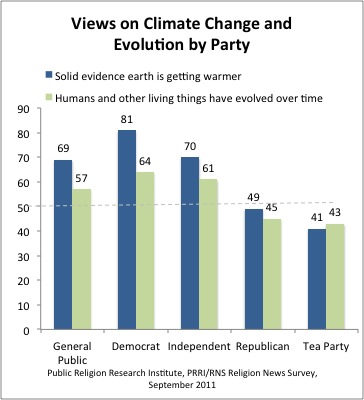Climate Change and Evolution in the 2012 Elections
I. Americans hold complex beliefs about the evolution
A majority (57%) of Americans believe that humans and other living things have evolved over time, compared to 38% who say that humans and other living things have existed in their present form since creation.
More than 6-in-10 political independents (61%) and Democrats (64%) affirm a belief in evolution, compared to 45% of Republicans and 43% of Americans who identify with the Tea Party.
Nearly two-thirds (66%) of white mainline Protestants, 61% of Catholics, and 77% of the unaffiliated believe humans and other living things evolved over time, compared to only about one-third (32%) of white evangelicals. African American Protestants are evenly divided on the question, with 47% affirming a belief in evolution and 46% affirming a belief in creationism.
Americans hold complex beliefs about the process of evolution. Among those affirming a belief in evolution, a majority (53%) say evolution is due to natural processes, compared to 38% who say a supreme being guided the process. Among those affirming creationism, fully half (50%) say humans and other living thing were created within the last 10,000 years, compared to 39% who disagree.
White evangelical Protestants (33%) and Americans who identify with the Tea Party (31%) were significantly more likely than other religious or political groups to believe that humans were created within the last 10,000 years.
II. Political Divisions on Climate Change
Nearly 7-in-10 (69%) Americans say that there is solid evidence that the average temperature on earth has been getting warmer over the past few decades, compared to only 26% who disagree.
There are large, asymmetrical political divisions over belief about climate change. Eighty-one percent of Democrats and 7-in-10 independents believe the earth is getting warmer, compared toless than half (49%) of Republicans and only about 4-in-10 (41%) Americans who identify as members of the Tea Party.
Strong majorities of every religious group say that the average temperature on earth has been getting warmer, including 7-in-10 Catholics and the unaffiliated, 63% of white mainline Protestants, and 57% of white evangelicals.
Americans are divided along partisan and religious lines about the underlying causes of climate change. Among those who believe the earth is getting warmer, nearly two-thirds (64%) believe that climate change is caused by human activity, compared to 32% who say it is caused by natural environmental patterns.
Less than 1-in-5 Republicans (18%) and Tea Party members (18%) believe that climate change is caused by human activity, compared to 60% of Democrats.
White evangelicals are significantly less likely to believe that the earth is getting warmer and that changes are caused by human activity (31%) than white mainline Protestants (43%), Catholics (50%), or the unaffiliated (52%).
III. Presidential Candidates, Evolution, and Climate Change
A majority (53%) of Americans say that if a candidate does not believe in evolution, it would have no effect on their likelihood of voting for the candidate. Among those who say it matters, more than twice as many say they would be less likely (32%) than say they would be more likely (13%) to vote for the candidate.
White evangelical Protestants are the only demographic group among whom the balance is the other way: nearly one-third (32%) say they would be more likely to vote for a candidate who did not believe in evolution, compared to 24% who say they would be less likely. Only 40% say a candidate’s belief in evolution would make no difference to their vote.
A majority (54%) of Americans also say that if a candidate said they did not believe climate change is caused by human activity, if would have no effect on their likelihood of voting for the candidate. Among those who say it matters, four times as many say that they would be less likely (36%) than say they would be more likely (9%) to support a candidate who does not believe in human-caused climate change.
Members of the Tea Party are much more likely than any other group to say that they would be more likely (33%) than less likely (24%) to support a candidate who does not believe in climate change. Only 16% of Republicans, 9% of independents, and 5% of Democrats say they would be more likely. Half of Democrats say it would make them less likely to support a candidate who did not believe climate change is caused by human activity.
IV. Scientific Consensus on Evolution, Climate Change
Americans are more likely to believe the science is settled on evolution than to say the science is settled on climate change.
A slim majority (51%) of Americans believe that scientists generally agree that humans evolved over time. About one-quarter (26%) say they are divided, and 15% say scientists generally disagree that humans evolve over time.
On the question of scientific consensus, the modest political differences between Republicans (47%) and Democrats (52%) are not significant. Americans who identify with the Tea Party movement, however, are much less likely than Republicans or the public to believe there is scientific consensus on the issue of evolution (36%). Among religious groups, white evangelical Protestants (37%) are significantly less likely than other religious groups to believe that scientists generally agree that humans evolved over time.
Only 4-in-10 Americans believe that scientists generally agree that the earth is getting warmer because of human activity. Nearly as many (37%) say the scientific community is divided, and 15% believe scientists generally disagree that humans are causing temperatures on earth to rise. Democrats (53%) and independents (42%) are much more likely to believe that scientific consensus has been reached on the issue of climate change than Republicans (21%) or members of the Tea Party (22%).
White evangelicals (27%) and white mainline Protestants (32%) are much less likely to agree that there is scientific consensus on the causes of climate change than black Protestants (47%), Catholics (48%) or the unaffiliated (43%).
V. Stewardship, the Economy, and the Environment
Nearly 6-in-10 (57%) of Americans agree that God gave humans beings the task of living responsibly with animals, plants and the resources of the planet, compared to 36% who say that God gave human beings the right to use animals, plants and all the resources of the plant for human benefit.
Half of Americans believe dealing with climate change now will create new jobs and help avoid more serious economic problems in the future, compared to 43% who believe that given current economic problems we cannot afford to deal with climate change. There are few religious or political differences on either of these questions.
Recommended citation:
Jones, Robert P., and Daniel Cox. “Climate Change and Evolution in the 2012 Elections.” PRRI. 2011. http://www.prri.org/research/climate-change-evolution-2012/.





